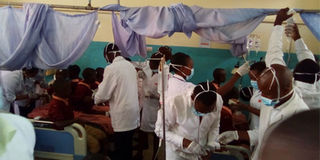Medics rule out cholera as Chetoto pupils are taken ill

Medics at Kitale County Hospital attending to Chetoto Primary School pupils on May 8, 2019. Medics have ruled out cholera infection. PHOTO | GERALD BWISA | NATION MEDIA GROUP
What you need to know:
- The pupils were experiencing diarrhoea and vomiting on Wednesday.
- Ms Lipesa, who cited contaminated water or food as the possible cause of the infection, revealed that a teacher had also been infected.
Medics in Trans Nzoia County were Wednesday evening carrying out further tests on dozens of pupils of Chetoto Primary School in Kipsongo, Saboti Constituency, who were rushed to hospital with cholera-like symptoms.
At least 100 pupils were being treated at Kitale County Referral Hospital where they were admitted after complaining of vomiting, diarrhoea and stomach ache earlier in the day after drinking water from a nearby river.
Although preliminary tests ruled out cholera, medical officials said they were conducting further tests to be sure none of them had contracted the deadly disease.
Kitale County Referral Hospital Medical Superintendent Lilian Lipesa said the pupils had been given drugs to contain diarrhoea and stop the vomiting.
"We are managing them for diarrhoea. Most of them, let's say 95 per cent, are stable," said Dr Lipesa. "The laboratory results we have from sampled pupils are negative (for cholera). But we are still doing more investigations," she said.
POTABLE WATER
The Medical Superintendent said they were suspecting food poisoning or contaminated water caused the diarrhoea. A teacher was also among those admitted.
Residents said water from a nearby river, which pupils drink while in school, could have been contaminated by a burst sewer.
The school, located in Kipsongo slums within Kitale town, does not have tapped water, forcing pupils to drink from the nearby spring.
"The pupils and teachers drunk water from the local spring suspected to be contaminated by raw sewer," said Gilbert Simiyu, a resident.
Last evening the county sent clinical officers to the school to take more samples for tests.
"We have dispatched medical staff to the ground to carry out health education and sensitise the community around the area on water treatment and chlorination," added Dr Lipesa.
Some of the pupils, whose condition had improved, were discharged but several still remained admitted.
The Public Health Surveillance officer for Saboti, Mr Stanley Kirwa, assured members of the public that the situation was under control.
Last year, a cholera outbreak in the same area saw a number of people treated in nearby facilities. The county then issued a ban on roadside eateries to contain the disease.





